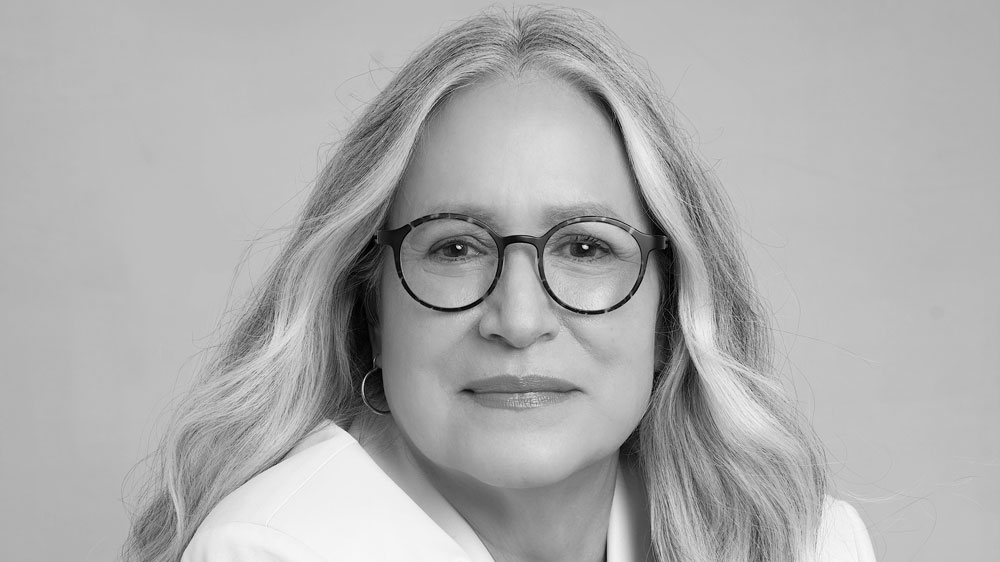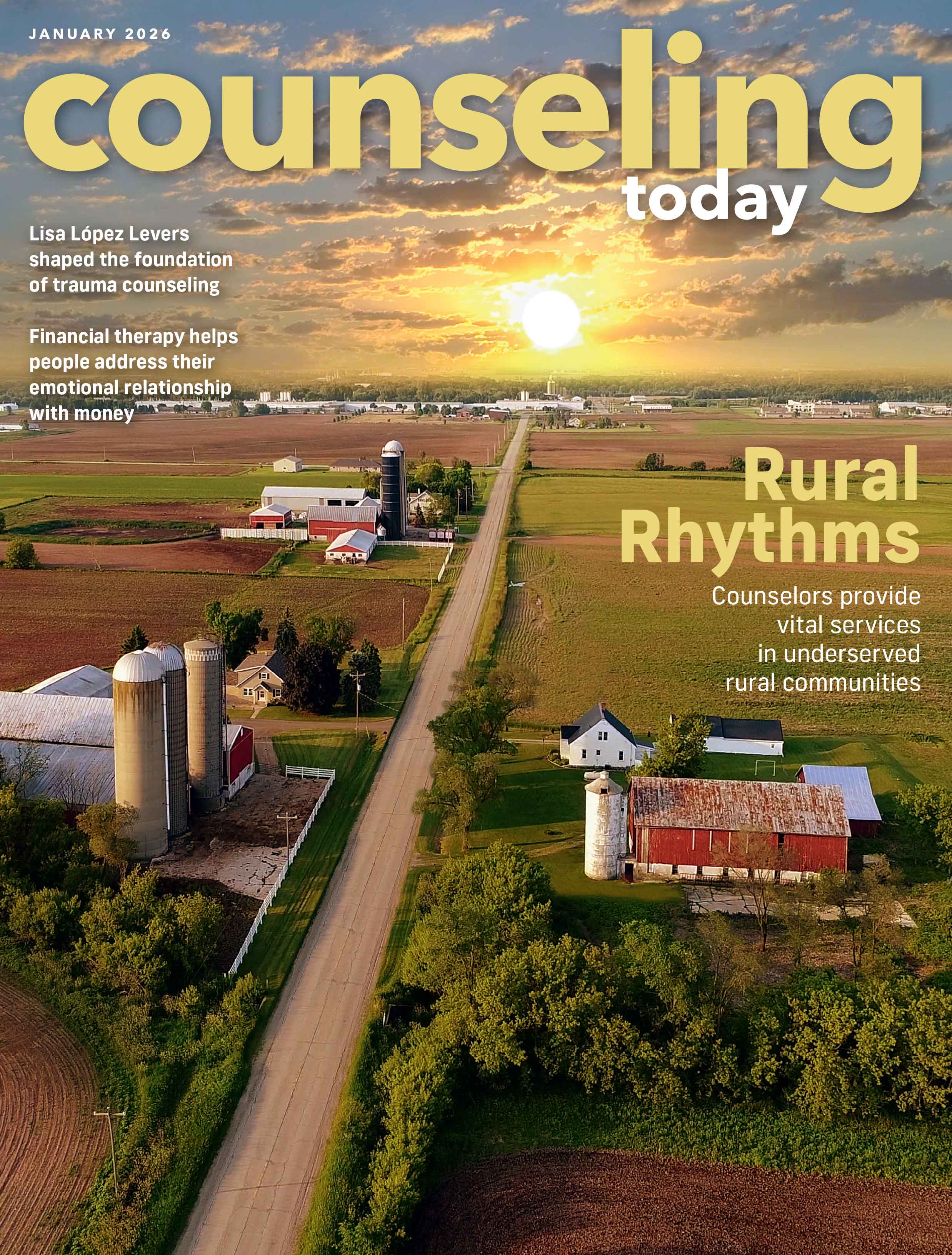Leading with Heart and Heritage
By Priscilla Blossom
July 2025

New ACA President M. Elsa Soto Leggett, PhD, LPC-S, RPT-S, CSC, stands on the shoulders of her ancestors. She comes from a long line of educators and academics, including Sarita Soto Zajicek, the first Latina American woman to receive a PhD from the University of Texas, and Clemente Martinez, a notable educator and public education advocate in Texas who became the namesake of one of Houston’s elementary schools.
Soto Leggett also faced her share of hurdles: She is a Mexican American woman with dyslexia, who grew up at a time when doors were frequently shut to women, Latinos and other minorities.
“Every academic achievement I have is like a surprise,” she says. “My high school counselor didn’t encourage me to go to college. He said, ‘Maria, go get a job!’”
Despite this, she never bought into limitations others tried to place on her, instead listening to those who encouraged her. “My parents were both educated, so I knew I would go to college,” she says. “They never said, ‘Stop trying to get a degree.’”
Soto Leggett has since racked up an impressive list of achievements. She is an associate professor and practicum and internship coordinator at Truman State University in Kirksville, Missouri.
She joined ACA in 2002 and was a founding member of the Association for Child and Adolescent Counseling — a chartered division of ACA — for which she won an award. She is also the recipient of the 2012 Dr. Jamesanna Kirven Outstanding Counselor Award, 2016 Distinguished Faculty Service Award from the University of Houston Victoria, 2022 Ashley Jadine Foundation Hall of Fame Award and countless others. Soto Leggett also served as president of the Texas Counseling Association from 2021 to 2024 (which earned her its 2023 Presidential Award). She became ACA president July 1.
While she didn’t have strategic plans for becoming ACA president, Soto Leggett is never one to shy away from a new challenge. “I consider myself to be a servant leader,” she says. “I have been in a lot of different leadership roles, but it’s always been an ask.”
Growing Up in Service
Soto Leggett grew up in a middle-class home in Houston, the youngest of three siblings and surrounded by extended family. Her mother worked as a nurse, while her father was an engineer. Faith and family were both paramount to the Sotos, and they attended a Spanish-speaking Methodist church founded by her great grandfather, Basilio Soto.
Service work was also of utmost importance. “My father was a preacher’s kid,” she recalls. “We were always in church and always doing things for others.”
In fact, altruism drew her to counseling. When she was in high school, her mother suggested she go into social work — counselor education wasn’t as well-known at the time.
But her path into counseling wasn’t a straight one. Initially, she pursued a wholly different career: photojournalism.
From Photography to Pedagogy
The paternal side of Soto Leggett’s family was filled with gifted artists. Her father’s first cousin, Ismael Soto, for example, was a well-known potter in Austin, Texas, whose work was displayed in the Smithsonian.
Because her older sister had started painting — claiming that medium — she knew she needed to find her own artistic path. “I took up photography because it was something different than what my sister was doing. Then, somebody bought me a camera and I really liked it.”
Soto Leggett was photo editor of her college newspaper for a summer but eventually left her studies behind and moved to Austin to work in a photo lab. After several years, though, she longed for a more stable career and returned to school to get a degree in education.
“Being dyslexic and going to college, I actually didn’t graduate till I was 30,” she says. “I went to a lot of schools, and I’d go for a while and struggle, and then I’d drop out and go for a while and struggle.”
A year after she graduated, she married a Methodist preacher, Richard L. Leggett, whose career involved frequent moves. Now armed with her degree from Texas Southern University, Soto Leggett found herself accepting positions in elementary and middle schools across Texas.
A Seamless Transition
After spending over a decade as a teacher, Soto Leggett felt another calling — this time to counseling.
She spent the next few years in pursuit of higher education: First, a master’s degree in school counseling and later a doctorate in counselor education, both from Texas A&M University-Corpus Christi. She achieved this while raising her two sons, Joseph Lee and Daniel, and her daughter, Annamarie. She looks back fondly on her days as an elementary school counselor, where she was able to use the skills she’d learned about play therapy while completing her PhD.
She’s a passionate advocate for the modality and still has a small practice supervising others getting their LPC license as well as becoming registered play therapists. “There’s such a uniqueness to working with toys and children,” she says. “It’s so simple and yet so impactful if you understand what’s happening.”
Despite never returning to photojournalism, Soto Leggett says she still sees plenty of overlap between it and counseling. “In journalism, you learn how to ask questions and listen to people’s stories, and you retell the story to the public. In counseling, you learn how to ask questions and retell the story to the client,” she says. “I was always curious about people and always open to hearing their stories and trying to see if there were ways I could be helpful.”
Though the age group of her students has changed, Soto Leggett continues to enjoy her work as an educator, helping aspiring counselors find their way.
How Identity Shapes Her Experiences
Growing up, Soto Leggett says many around her assumed she was not Mexican American due to her complexion. “It took me until my senior year to understand that of course I am Latina. My parents are. My grandparents are,” she says. “I just don’t fit the stereotype.”
And because she goes by her middle name (her first name is Maria), she says she still has to remind others of her identity, which remains a pivotal part of her life. It’s especially important to her now that she is in her new leadership position as ACA president — only about 11% of all counselors are Hispanic, despite making up around 19% of the U.S. total population.
“I’ll be the 74th ACA president, but I’m only the fourth Hispanic, Latina president. That tells you right there that we’re not representing,” she says.
She recognizes the challenges other Latin individuals face and tries to offer a little extra support to students who share her background. “You can see yourself when you see other people who look like you in those positions,” she says.
She also encourages her bilingual students to consider getting placement in more than one language. “I always tell them, ‘There are people out there who speak whatever language you know how to speak, and they’re waiting for somebody like you to come and listen to them,’” she says. “I’ve been able to get people placed in dual or multilingual settings so they could begin that journey of becoming a multilingual counselor, which is really important to me.”
She has also become more open about talking about her dyslexia. As a child, she was taught to hide her learning disability. Despite knowing it caused her to struggle academically, some family members urged against her being labeled, fearing repercussions. But without that extra support, her initial school years were challenging.
By the time she returned to school for her teaching degree, she had learned how to compensate for her learning disability. Despite still struggling at times, she says she’s found a lot of support through her colleagues.
“Sometimes I’ll have something I’ve written by myself and I’ll ask someone to review it for me,” she says. “Everybody should have a group like that who support and promote each other.”
Though it took her a long time to talk about her dyslexia publicly, she says it’s been something she’s become more open with over the past five years, especially once she realized it might help others.
“One of my students, who had a traumatic brain injury, was talking in class about her challenges and at some point, I mentioned I was dyslexic,” she says. “She said, ‘I’m so glad you told me that because it just made me feel so much better.’”
The Future Looks Bright
When someone from the Association for Child and Adolescent Counseling division asked her to run as their nominee for ACA president, Soto Leggett said she first had to consider the time commitment and talk with her husband. Now, she looks forward to finding the best way to serve ACA, its members and the counseling community.
“As a female neurodivergent Mexican American, I hope others see some part of themselves and the opportunities they have before them,” she says. “My ancestors and family have always sought to make the path wider and smoother for those that follow behind us. Sí se puede!”


